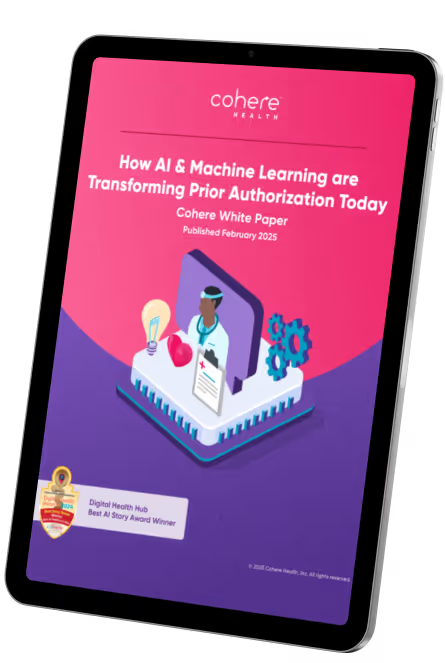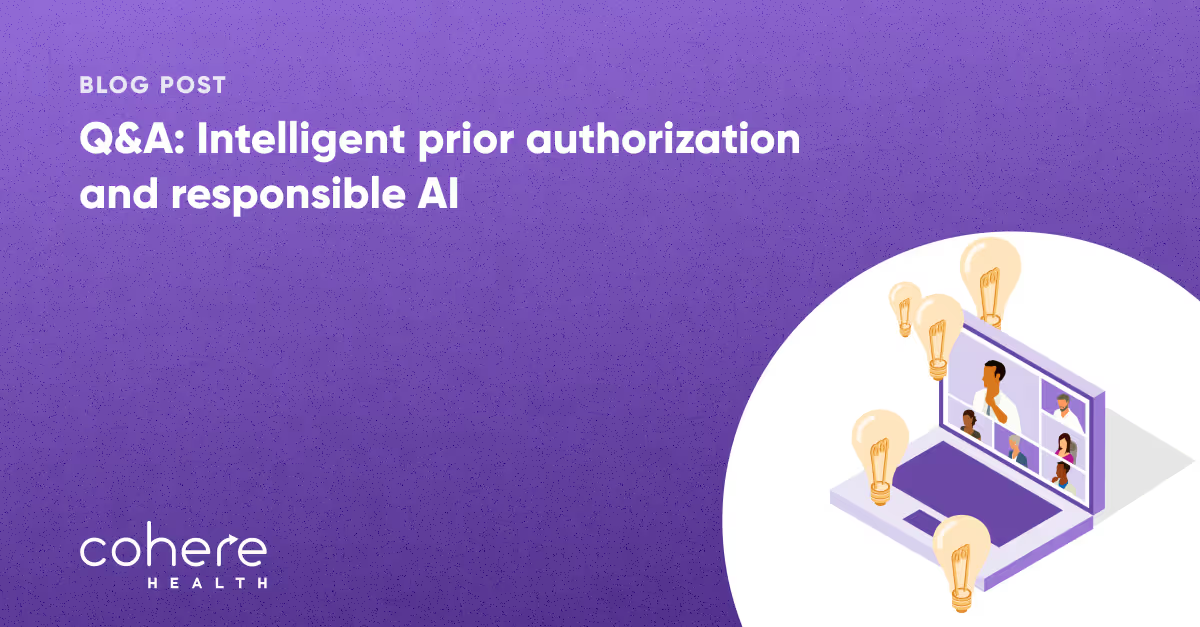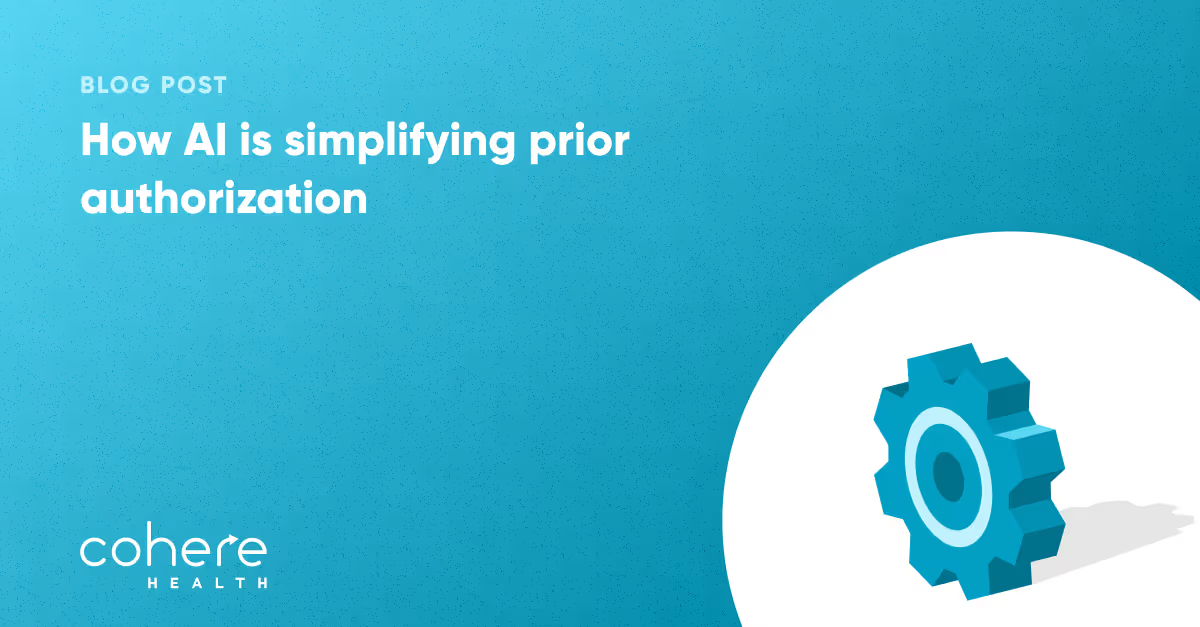Responsible AI and the prior authorization trends making waves in 2024
Published:
January 24, 2024

Ongoing media criticism of prior authorization catalyzes state and federal regulatory action
The past several months have seen non-stop media coverage and criticism of the prior authorization process and of utilization management in general.
Some of the media highlights I’ve noticed include:
- The finalization of CMS-0057-F, Interoperability and Prior Authorization Final Rule, which includes several key provisions to improve prior authorization
- 2022 The American Medical Association (AMA) physician survey: 94% of physicians report care delays associated with prior authorization
- Bills in 30 states show momentum to fix prior authorization
- ProPublica revealed that over a period of two months in 2022, Cigna doctors denied more than 300,000 claims as part of a review process that used artificial intelligence, with Cigna doctors spending an average of 1.2 seconds on each case.
Most recently, I’ve been intrigued by a larger discussion in tech about “responsible AI.” With McKinsey estimating that generative AI can help healthcare realize $1 trillion in improvement potential, it’s no wonder healthtech companies are focused on adopting new uses for the advanced technology. The use of AI in process automation is fairly widespread, but new generative capabilities have got everyone thinking about using AI to supplement tasks previously thought to require a “human touch.” When implementing AI in our solutions, we utilize a core set of principles: accountability, transparency, privacy and security, and inclusiveness and fairness, to make sure that AI is not replacing the work done by humans, but instead changing the way humans work to make the prior authorization process more efficient, and for the process to actually improve care quality and access.
The AMA is a leader in advocating for policies to improve the burden of prior authorization, but with the buzz around generative AI, they issued a statement calling for more oversight of AI in prior authorization, urging plans to consider ethically automating prior authorization and reducing the number of services requiring prior authorization.
Luckily, state and federal governing bodies understand the urgency to regulate prior authorization reform. In the past year, they have passed legislation and introduced new regulations in response to these popular criticisms, but it can be a little overwhelming for health plans trying to stay ahead of the curve.
Here’s a refresh of the recent regulatory highlights . . . to date!
Utilization management requirements of CMS’s MA and Part D final rule emphasize timely access to care
Reflecting on these impacts and responses, we are seeing three changes catalyzed by the pandemic:
Health plans must act immediately to implement the provisions included in the CMS Medicare Advantage and Part D Final Rule by January 2024. Any new initiatives on this front will likely help plans’ larger regulatory compliance strategies for upcoming CMS rules and state legislation. Intelligent prior authorization solutions enable regulatory compliance with utilization management provisions and drive:
- Improved patient outcomes
- Reduced delays in care
- Promotion of health equity among Medicare beneficiaries
- Increased transparency for physicians and health plans
This article by Alina Czekai, Vice President of Strategic Partnerships, explores how intelligent prior authorization uses AI to deliver added value while enabling plans to comply with the rule’s UM provisions. One example to look out for is how Cohere is using AI to reduce low-value utilization by up to 15% using pre-submission influence technology, like nudges.
CMS is leveraging prior authorization transactions to improve interoperability and transparency
Despite the regulatory progress made in improving interoperability challenges in healthcare, some challenges persist. CMS’s prior authorization and interoperability final rule targets the following remaining areas:
- Lack of a standardized application programming interface (API)
- Fragmented health information exchanges (HIEs)
- Minimal incentive for data exchange between healthcare stakeholders
Two key provisions in the rule relate specifically to improving interoperability, transparency, and data exchange between providers, health plans, and patients.
- Health plans must build and maintain a Fast Healthcare Interoperability Resources (FHIR) API (PARDD API) that has a list of covered items and services, can identify documentation requirements for prior authorization approval, and supports a prior authorization request and response.
- These prior authorization APIs must also communicate whether the payer approves the prior authorization request (and the date or circumstance under which the authorization ends), denies the prior authorization request (and a specific reason for the denial), or requests more information.
Engineering Operations Manager Jason Amaral breaks down how intelligent prior authorization solutions help health plans solve interoperability and transparency challenges in this article. In it, you’ll also find how Cohere uses clinical intelligence to package the most relevant information from provider-submitted evidence for reviewers to accelerate manual review.

Green lighting is a data-driven alternative to gold carding that reduces the burden and enhances care quality
Green lighting leverages real-time data-driven intelligence with industry and peer benchmarking and evidence-based guidelines to isolate providers with high-volume and outlier performance (percent approval and denial) for specific service requests.
Green lighting uses ongoing and real-time provider evaluations instead of the manual “moment in time” annual or semi-annual performance reviews commonly used. Green lighting expedites the process, but does not exempt providers from submitting clinical data. Therefore, green lighting criteria can be adjusted if the utilization is inappropriately increasing.
Read more in this article by Tracy Zheng, PhD, Vice President of Clinical Programs and Quality Analytics. You’ll learn how Cohere is using AI-driven analytics in our green lighting program.
Download our white paper, How keeping up with CMS regulatory changes will drive better patient outcomes, to dive into how intelligent prior authorization can help plans comply with federal regulations while improving utilization and patient outcomes.
Available For Download
Stay ahead with expert insights on transforming utilization management and payment integrity—delivered straight to your inbox.




